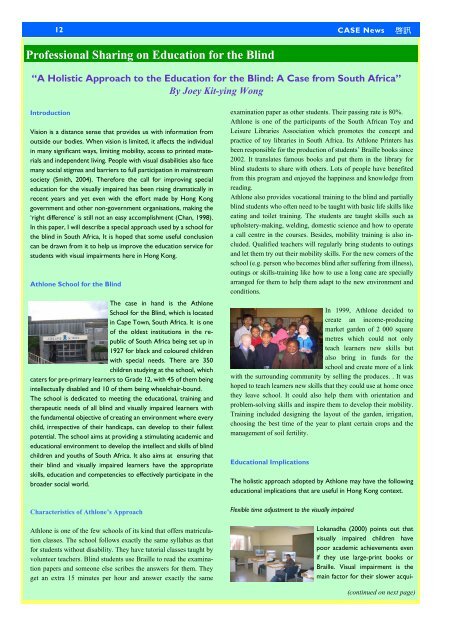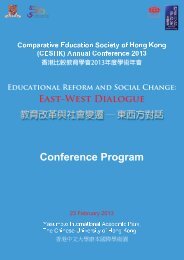Issue No.5 - Faculty of Education - The University of Hong Kong
Issue No.5 - Faculty of Education - The University of Hong Kong
Issue No.5 - Faculty of Education - The University of Hong Kong
You also want an ePaper? Increase the reach of your titles
YUMPU automatically turns print PDFs into web optimized ePapers that Google loves.
12<br />
Pr<strong>of</strong>essional Sharing on <strong>Education</strong> for the Blind<br />
Pr<strong>of</strong>essional Sharing:<br />
“A Holistic Approach to to the <strong>Education</strong> for the Blind: A Case from South Africa”<br />
By Joey Kit-ying Wong<br />
By Joey Kit-ying Wong<br />
Introduction<br />
Vision is a distance sense that provides us with information from<br />
outside our bodies. When vision is limited, it affects the individual<br />
in many significant ways, limiting mobility, access to printed materials<br />
and independent living. People with visual disabilities also face<br />
many social stigmas and barriers to full participation in mainstream<br />
society (Smith, 2004). <strong>The</strong>refore the call for improving special<br />
education for the visually impaired has been rising dramatically in<br />
recent years and yet even with the effort made by <strong>Hong</strong> <strong>Kong</strong><br />
government and other non-government organisations, making the<br />
‘right difference’ is still not an easy accomplishment (Chan, 1998).<br />
In this paper, I will describe a special approach used by a school for<br />
the blind in South Africa, It is hoped that some useful conclusion<br />
can be drawn from it to help us improve the education service for<br />
students with visual impairments here in <strong>Hong</strong> <strong>Kong</strong>.<br />
Athlone School for the Blind<br />
<strong>The</strong> case in hand is the Athlone<br />
School for the Blind, which is located<br />
in Cape Town, South Africa. It is one<br />
<strong>of</strong> the oldest institutions in the republic<br />
<strong>of</strong> South Africa being set up in<br />
1927 for black and coloured children<br />
with special needs. <strong>The</strong>re are 350<br />
children studying at the school, which<br />
caters for pre-primary learners to Grade 12, with 45 <strong>of</strong> them being<br />
intellectually disabled and 10 <strong>of</strong> them being wheelchair-bound.<br />
<strong>The</strong> school is dedicated to meeting the educational, training and<br />
therapeutic needs <strong>of</strong> all blind and visually impaired learners with<br />
the fundamental objective <strong>of</strong> creating an environment where every<br />
child, irrespective <strong>of</strong> their handicaps, can develop to their fullest<br />
potential. <strong>The</strong> school aims at providing a stimulating academic and<br />
educational environment to develop the intellect and skills <strong>of</strong> blind<br />
children and youths <strong>of</strong> South Africa. It also aims at ensuring that<br />
their blind and visually impaired learners have the appropriate<br />
skills, education and competencies to effectively participate in the<br />
broader social world.<br />
Characteristics <strong>of</strong> Athlone’s Approach<br />
Athlone is one <strong>of</strong> the few schools <strong>of</strong> its kind that <strong>of</strong>fers matriculation<br />
classes. <strong>The</strong> school follows exactly the same syllabus as that<br />
for students without disability. <strong>The</strong>y have tutorial classes taught by<br />
volunteer teachers. Blind students use Braille to read the examination<br />
papers and someone else scribes the answers for them. <strong>The</strong>y<br />
get an extra 15 minutes per hour and answer exactly the same<br />
examination paper as other students. <strong>The</strong>ir passing rate is 80%.<br />
Athlone is one <strong>of</strong> the participants <strong>of</strong> the South African Toy and<br />
Leisure Libraries Association which promotes the concept and<br />
practice <strong>of</strong> toy libraries in South Africa. Its Athlone Printers has<br />
been responsible for the production <strong>of</strong> students’ Braille books since<br />
2002. It translates famous books and put them in the library for<br />
blind students to share with others. Lots <strong>of</strong> people have benefited<br />
from this program and enjoyed the happiness and knowledge from<br />
reading.<br />
Athlone also provides vocational training to the blind and partially<br />
blind students who <strong>of</strong>ten need to be taught with basic life skills like<br />
eating and toilet training. <strong>The</strong> students are taught skills such as<br />
upholstery-making, welding, domestic science and how to operate<br />
a call centre in the courses. Besides, mobility training is also included.<br />
Qualified teachers will regularly bring students to outings<br />
and let them try out their mobility skills. For the new comers <strong>of</strong> the<br />
school (e.g. person who becomes blind after suffering from illness),<br />
outings or skills-training like how to use a long cane are specially<br />
arranged for them to help them adapt to the new environment and<br />
conditions.<br />
In 1999, Athlone decided to<br />
create an income-producing<br />
market garden <strong>of</strong> 2 000 square<br />
metres which could not only<br />
teach learners new skills but<br />
also bring in funds for the<br />
school and create more <strong>of</strong> a link<br />
with the surrounding community by selling the produces. . It was<br />
hoped to teach learners new skills that they could use at home once<br />
they leave school. It could also help them with orientation and<br />
problem-solving skills and inspire them to develop their mobility.<br />
Training included designing the layout <strong>of</strong> the garden, irrigation,<br />
choosing the best time <strong>of</strong> the year to plant certain crops and the<br />
management <strong>of</strong> soil fertility.<br />
<strong>Education</strong>al Implications<br />
<strong>The</strong> holistic approach adopted by Athlone may have the following<br />
educational implications that are useful in <strong>Hong</strong> <strong>Kong</strong> context.<br />
Flexible time adjustment to the visually impaired<br />
CASE News 啟訊<br />
Lokanadha (2000) points out that<br />
visually impaired children have<br />
poor academic achievements even<br />
if they use large-print books or<br />
Braille. Visual impairment is the<br />
main factor for their slower acqui-<br />
(continued on next page)
















